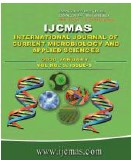


 National Academy of Agricultural Sciences (NAAS)
National Academy of Agricultural Sciences (NAAS)

|
PRINT ISSN : 2319-7692
Online ISSN : 2319-7706 Issues : 12 per year Publisher : Excellent Publishers Email : editorijcmas@gmail.com / submit@ijcmas.com Editor-in-chief: Dr.M.Prakash Index Copernicus ICV 2018: 95.39 NAAS RATING 2020: 5.38 |
Marine aquaculture is the fastest growing food producing sector with major contribution from carps in terms of volume and shrimp by value. Continuous development of aquaculture demands new alternative technologies to achieve sustainable production with low economic cost. The microbial based systems like biofloc technology (zero water exchange systems) and artificial substrate integrated (periphyton based) in normal culture systems represents the best methods of practice to get healthy shrimp production. The microbial based systems are eco-friendly aquaculture practices which can stimulate both heterotrophic or autotrophic groups of bacteria by maintaining carbon to nitrogen ratio (C:N) that can converts nitrogenous wastes into useful microbial biomass which can serve as natural food source for the cultured organisms. On other side, biofloc and periphyton helps in improving water quality by the removal of toxic nitrogenous substances from these systems. This technology is economically viable, eco-friendly, and socially acceptable.
 |
 |
 |
 |
 |